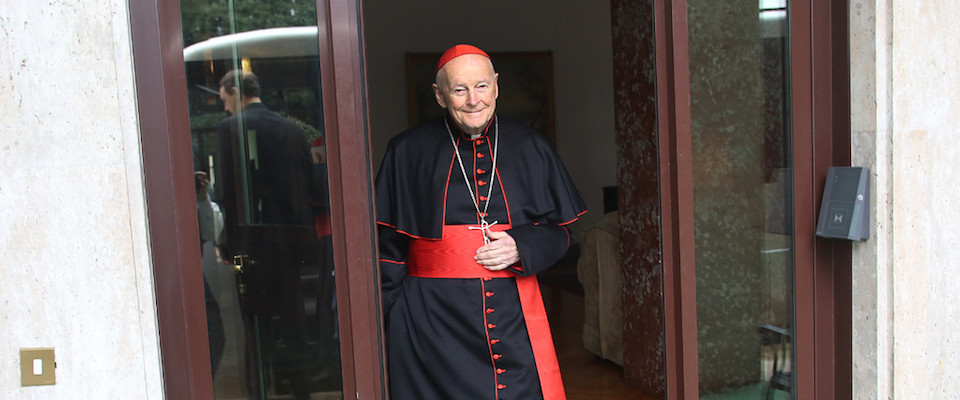By Robert P. George, First Things, 8 . 20 . 18
At the heart of the recent Catholic scandals is infidelity—literally the lack of faith. There are priests, including bishops and even cardinals, who do not believe in God, or whose belief in God is merely notional (as definitively evidenced by their lack of fear of Him). In any event, they don’t believe what the Catholic Church teaches about morality (and by morality, I mean not only sexual morality, but also our obligations to love and respect, and not to exploit or abuse, others), or at least they are unwilling or unable to embrace that teaching and embody it in a consistent way in their lives and ministries. So they are unfaithful to, among other things, their vows of chastity and the Church’s teachings about sex and marriage and the duty never to exploit or abuse.
What is the answer? Well, fundamentally the answer to infidelity is fidelity. That is what is needed. As my late friend Fr. Richard John Neuhaus put it, “fidelity, fidelity, fidelity.” There is no proper place for unfaithful priests (of any rank) in the Church. If a man does not believe what the Church teaches about God, about the dignity of the human person, about sex and marriage, or about justice, he should not function as a priest or serve as a bishop. If he cannot or will not proclaim those teachings, and certainly if he cannot or will not lead his life consistently in line with those teachings, he should not be ordained (if he is, or proposes to become, a seminarian) or, if he is already ordained, his priestly faculties should be removed. Period.
Obviously if priests (or others holding office or serving in the Church, such as lay religious educators or music ministers) commit crimes they should be handed over to public authorities for prosecution just as anyone else would be handed over. But even where serious wrongdoing is not illegal, it must not be tolerated. Of course, none of us gets through the day without sinning and needing to repent and be reconciled. (In the Catholic understanding of Christian faith, conversion is an ongoing and lifelong process beginning with baptism.) So what I am talking about here are grave sins, including not only exploitation and abuse but also serious sins against chastity such as fornication, adultery, and sodomy. These are sins for everyone, of course, but when committed by priests they take on the character of sacrilege and are generally even more scandalous than when committed by lay people. Of course, when they are committed by priests with adolescents, as in the case of pederasty, they are even more heinous; and when they involve prepubescent children there is simply no word strong enough to convey the depth of their wickedness.
So here is what I think needs to happen going forward. No one should be ordained or retained by his bishop as a priest (and certainly no one should be consecrated as a bishop) who does not believe, and is not prepared publicly in carrying out his priestly ministry to proclaim, the teachings of the Church on all points on which the Church solemnly teaches—including her teachings, in all particulars, on the dignity of the human person, on sex and marriage, and on the requirements of justice. Any seminarian who is guilty of grave sexual misconduct, whether that conduct involves women or other men, and certainly if it involves minors, should be expelled from the seminary. Any priest (of any rank—going all the way up to pope) who is guilty of such misconduct should be stripped of his priestly faculties.
In short, what the Church (and by “the Church” I am referring to the lay faithful as well as to the Church’s hierarchical officials) should demand—that is, absolutely insist upon without exception—of its clergy is what the clergy should preach to the people, namely, fidelity. Fidelity, fidelity, fidelity. Priests must believe and preach what the Church holds as true about God and man—and must practice what they preach. Am I advocating a zero-tolerance policy toward grave sexual sins, such as fornication, adultery, and sodomy (even when committed by consenting adults)? Yes, I am. It is not because I think these sins are unforgivable, or even that they are the worst sins. (In fact, they are forgivable and, though grave, they are not the worst sins.) It is because the infidelity expressed by and embodied in these sins, and because the scandal—undermining of the faith (including the faith of the sinning priest and the faith of the person with whom he sins)—they occasion, is simply intolerable. These sins are toxic to the priestly ministry. Priests who cannot or will not avoid them cannot effectively carry out their mission.
Theodore McCarrick should have been prosecuted for his alleged crimes against boys. But even apart from those crimes, McCarrick should be stripped of his office and dismissed from the active priesthood for his sexual activity with adult men, including seminarians. The same would be true if his sexual partners had been women rather than men. The issue here is not homosexuality as such, but is rather sexual immorality (and in many cases exploitation and abuse), including but not limited to homosexual conduct. And what I say here about McCarrick applies to every priest of any rank who disgraces the priesthood by committing grave sexual sins in defiance of his vow of chastity. Their infidelity—in every sense of the term—literally cannot be tolerated. It is a poison in the bloodstream of the Church.
Robert P. George is McCormick Professor of Jurisprudence at Princeton University, where he teaches constitutional interpretation and philosophy of law.
https://www.firstthings.com/web-exclusives/2018/08/a-crisis-of-infidelityhttps://www.firstthings.com/web-exclusives/2018/08/a-crisis-of-infidelity




